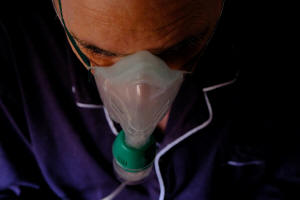High power prices drive some patients in Spain into poverty
 Send a link to a friend
Send a link to a friend
 [January 18, 2023]
MADRID (Reuters) - Jose Maria Casais's 2,700 euros-a-month income
from a pension and incapacity benefits ought to leave him better off
than most of his fellow Spaniards. [January 18, 2023]
MADRID (Reuters) - Jose Maria Casais's 2,700 euros-a-month income
from a pension and incapacity benefits ought to leave him better off
than most of his fellow Spaniards.
But Casais, a retired engineer living in Barcelona, says he is being
forced to raid his savings every month after his energy bills soared
because of his reliance on an oxygen machine to alleviate his chronic
obstructive pulmonary disease (COPD).
For the past two years, Casais has been plugged into the oxygen
concentrator for up to 24 hours a day. His electricity bill has almost
tripled since Russia invaded Ukraine in February, he says, triggering an
energy crisis in Europe because of its dependence on Russian gas. He's
part of a middle class in Spain being dragged into poverty by the
crisis. Nearly 4% of Spanish households in the fourth income decile - a
segment typically viewed as middle class - have spent more than half of
their income on energy since the rise in prices last year, an Oxfam
survey found.

Whereas before the energy crisis nearly half of households in Spain had
the capacity to save, Oxfam estimates that now only three in 10
households can do so.
Casais spends between 300 euros and 400 euros a month on energy - about
triple what he spent before the crisis - leaving little or nothing for
other essentials after his other medical expenses, which include a
live-in carer. By mid-month, he has to start drawing on his savings, he
said.
"It limits everything else; leaves no option for other things," Casais,
a former engineer at the state-run rail company Renfe, told Reuters in
his Barcelona apartment.
Casais' oxygen concentrator pulls air through a compressor, removing
nitrogen and filtering oxygen to deliver to the patient. Depending on
how much difficulty Casais has breathing on a given day, he will be
connected between 17 and 24 hours.
He is not alone. An estimated five million people in Spain suffer from
COPD, said Dr. Sergi Pascual, pulmonology unit coordinator at the
Hospital del Mar in Barcelona. It's the third largest cause of death
worldwide and the fourth in Spain, the Spanish Association for Patients
with COPD (APEPOC) says.
Patients in other countries are also suffering. A survey of more than
3,600 people with lung conditions by the charity Asthma + Lung UK found
that one in five Britons surveyed with asthma reported life-threatening
attacks as they cut back on medicines, heating and food because of the
soaring cost of living.
Sufferers of other maladies such as kidney failure dependent on
electricity-guzzling machines to survive are also struggling, two
medical groups representing kidney disease say.

Without his oxygen machine, Casais said he would have to be permanently
hooked up to a machine in hospital, losing his independence and costing
the state more.
AN IRREVERSIBLE DISEASE
COPD is "a chronic, irreversible disease," Pascual said, "so these
patients' objective is to live a useful and full life and they therefore
need the necessary funds".
[to top of second column]
|

Jose Maria Casais, 69, who is suffering
from flu, uses an oxygen nebuliser as he sits on a wheelchair inside
his house, in Barcelona, Spain, December 22, 2022. REUTERS/Nacho
Doce
 It's not only oxygen machines that
rack up bills. Pulmonary disease sufferers must carefully regulate
their homes' ambient temperature, which means relying on air
conditioning in Spain's searing summers and central heating in its
brisk winters.
"If the weather suddenly changes from good to a rainy day you feel
terrible," Casais said. "The cold affects your breathing."
Fernando Uceta, 61, who had a double lung transplant in August and
also suffers from COPD, says he avoids air conditioning and relies
on easier-to-monitor electric heaters to manage his costs.
"There's an energy poverty that some call the invisible version,
which is where people do what I do: put on less heating and not use
air conditioning. Or people turn off their oxygen machine and don't
receive the amount they need," Uceta said.
BETWEEN EATING AND BREATHING
Many electricity-dependent Spaniards are facing some stark choices,
said Nicole Hass, a spokesperson for APEPOC: "With this rise in
electricity prices they have to decide between eating and
breathing."
APEPOC wants Spain's local governments to subsidise energy bills for
all COPD sufferers, regardless of their income.

Spain's national health service covers the cost of oxygen but not of
electricity, Hass said. "What use is the oxygen if we don't have the
electricity to plug in the machine?"
APEPOC wants Spain to emulate countries like Argentina, which in
2017 made electricity free for electricity-dependent individuals. In
New Zealand, electricity retailers are obliged by law to provide
discounts for so-called medically dependent consumers.
Health policy in Spain is determined by its 17 autonomous regions.
An initiative last year by Catalan party Esquerra Republicana to
include patients dependent on medical devices in a list of
vulnerable consumers who receive help with their energy bills
stalled in the national parliament.
In response to Reuters questions, Catalonia's health ministry
pointed to a protocol approved by the regional government in 2020
that guarantees no-one has their electricity cut off. The measure
does not offer subsidies to help patients with high bills.
Casais has already altered his diet to cut costs. He now lives on
one-euro packets of processed meats and tins of tuna. He's now
considering remortgaging his apartment to cover his medical and
energy costs.
"They should give a direct discount on electricity bills to everyone
who is electricity-dependent regardless of their income or where
they live," he said.
(Reporting by Nacho Doce and Horaci Garcia; Writing by Charlie
Devereux; Editing by Daniel Flynn)
[© 2023 Thomson Reuters. All rights
reserved.]This material may not be published,
broadcast, rewritten or redistributed.
Thompson Reuters is solely responsible for this content. |